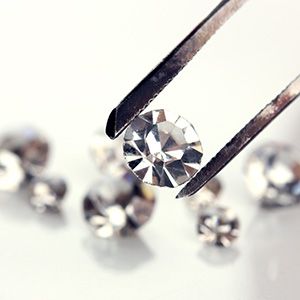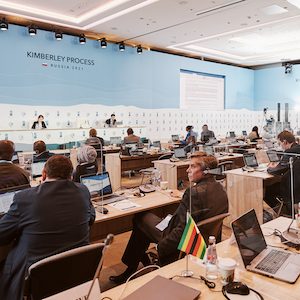
Just before Russia’s invasion of Ukraine, diamond miner Alrosa—which is 33% owned by the Russian government—released its latest sustainability report, which talks about helping communities, respecting the environment, and prioritizing social responsibility.
Which all sounds great, but is overshadowed by the fact that one of its owners has just become an international pariah.
Alrosa has long tried to be a “good actor” in the diamond business. Executives talked up its beneficial social impact and charitable efforts. They even discussed a Russian-origin brand, in part because its diamonds were “conflict-free.”
That, obviously, wouldn’t fly now. For as image conscious as Alrosa has been, and as much as it wants to be considered a modern, transparent company, the head of its one-third owner seems to relish his reputation as a malevolent dictator. And following the invasion of Ukraine, virtually the entire world has turned on both Russian President Vladimir Putin and the country he heads. Alrosa has not been spared from the worldwide backlash.
Russia’s actions in Ukraine have caused widespread revulsion. U.S. bars are pouring Russian vodka down the drain, and governors are calling for Russian products to be yanked from store shelves. And while Russian diamonds have so far received limited attention—and don’t fund its economy as much as natural gas—they could pose a significant PR and legal challenge for the industry. Russia is also a significant source of gemstones, as well as the world’s second largest producer of gold and platinum.
In the last few days, a long list of companies, from Walt Disney to Netflix to Apple, have halted or curtailed their Russian operations. Which shows: There’s no shame in companies saying they’ve done business with Russia, since just about all big ones have, and they felt they had to take a stand.
On Tuesday, Jewelers of America issued a member advisory warning that, due to “serious ethical, reputational, and legal risks, [it] strongly advises members to take measures to stop buying or selling diamonds, precious metals, and/or precious gemstones of Russian or Belorussian origin.”
It advises jewelers to get written assurances from suppliers that they are not selling Russian diamonds, using tools such as the U.S. Jewelry Council’s Diamond Source Warranty Protocol.
At publication time, among major companies, it seems only e-tailer Brilliant Earth has publicly said it’s pulling Russian gems. Signet and Tiffany, both members of the Alrosa Alliance, did not return requests for comment at the time of publication.
At Brilliant Earth, we remain committed to transparency and responsibility, and offering products that meet our high standards. We have removed all Russian mined diamonds from our website. 1/2
— Brilliant Earth (@BrilliantEarth) February 26, 2022
It is still legal for U.S., E.U., and U.K. citizens to deal with Alrosa, as well as any non-sanctioned Russian entities. (The current U.S. sanctions on Alrosa are limited to its issuance of new stocks and bonds.)
That said, it could be difficult for U.S. companies to pay for Russian rough—given how many Russian banks have been sanctioned—and to receive goods, as many jurisdictions are now closed to airplanes and boats coming to and from Russia.
In addition, if Alrosa is hit with further designations—and the sanctioning of its CEO is a signal it could be—they could take effect immediately, meaning any U.S. company directly dealing with the miner might need Treasury Department approval to modify contracts.
Current European Union sanctions specifically exempt Russian diamonds. (Also spared: Italian luxury goods.)
Tom Neys, spokesperson for the Belgian industry group Antwerp World Diamond Centre, calls this “sensible,” as the diamonds would likely to get purchased anyway.
“A sanction means you want to hurt a counterpart financially, but that’s not the case with Russian diamonds,” he says. “They will easily find another market outside the E.U. to sell their diamonds if they want to.”
That’s a clear reference to Antwerp’s archrival, Dubai, United Arab Emirates (UAE). (The UAE is considered a hot spot for Russian finance and has said it’s “not taking sides” on the invasion.)
Neys says that the longer the conflict goes on, the more Antwerp’s trade will be affected.
“The current sanctions that involve cutting off banks from SWIFT, closing down the E.U. airspace, and suspending flights to Russia will already have an impact on the industry. These are essential parts in the logistics of trading diamonds.
“All will depend on the future developments and how long this conflict will go on,” he says. “But this is not the priority. The priority is to end this conflict as soon as possible.”
Last week, Alrosa sent a businesslike email to its customers, which began: “We hope that global turbulence will not harm the diamond industry markets, the businesses with which we have close connections around the world, or the relationships that we have built over the decades through numerous crises on our market.”
It noted that while U.S. sanctions currently block Alrosa from American capital markets, it has strong financial resources. It wasn’t worried about sanctions on CEO Sergey S. Ivanov, since he doesn’t have any U.S. assets. Regarding finances, “we have a diverse range of banking partners, which allows us to operate normally without any delays,” it said.
An Alrosa spokesperson tells JCK it “is carefully studying new working conditions in connection with the imposed sanctions…. We do our best to fulfill our obligations so that their businesses would continue to operate as usual.”
But it isn’t business as usual now. At the end of its email, Alrosa asked for feedback. Here’s mine:
Until this invasion ends—and, possibly, until Russia sees regime change—the market for Russian diamonds has been severely damaged, particularly Russian diamonds from a government-owned miner.
Yes, the trade needs goods—though the market’s cooled off, in part because of the aforementioned “global events.” Selling them now, possibly at below-market prices, damages the industry that Alrosa says it cares about. Customers shouldn’t have to choose between their businesses and their conscience—or the law.
These sanctions may be necessary, but they will have ugly side effects. Russia’s economy has long been fragile, and these measures will cause innocent people to suffer both inside and outside the country. Unfortunately, it doesn’t seem like we have many other options for stopping this invasion.
Ultimately, Vladimir Putin and his enablers bear responsibility for this horror, not the Russian people, some of whom have risked their lives protesting it. One hopes further sanctions will target Russia’s elite. (According to Bloomberg, some rich Russians are buying luxury jewelry to prevent the “values of their savings melting away.”)
Alrosa has talked many times about the importance of customer confidence. The Ukraine invasion is the number one issue in the world right now. The industry doesn’t want to end up on the wrong side, and there’s little question what side that is.
Alrosa had said its diamond stockpile is at an “all-time low.” This might be a good time to let it build up.
(Disclosure: The author’s wife works for Jewelers of America.)
(Photo: Getty Images)
- Subscribe to the JCK News Daily
- Subscribe to the JCK Special Report
- Follow JCK on Instagram: @jckmagazine
- Follow JCK on X: @jckmagazine
- Follow JCK on Facebook: @jckmagazine





